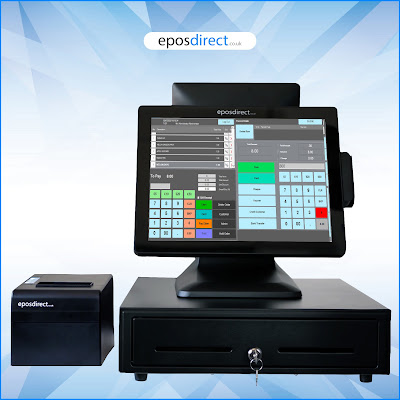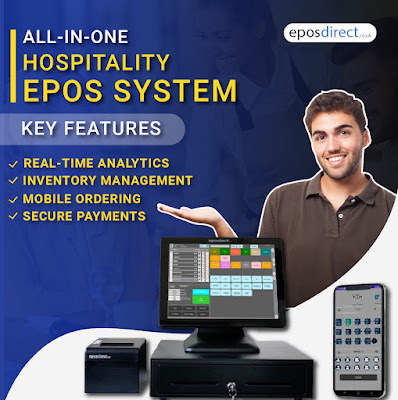In the
fast-paced and competitive world of the hospitality industry, efficient till
systems are the key to success. Whether you run a
restaurant, hotel, or any other establishment in the sector, streamlining your
operations can greatly impact your bottom line. One powerful tool for achieving
this goal is an Electronic Point of Sale (EPOS) system. EPOS systems have
revolutionized the way hospitality businesses operate, enhancing efficiency,
customer service, and overall profitability. In this article, we will explore
how EPOS systems can streamline operations in the hospitality industry and
discuss the various benefits they offer.
Benefits of EPOS Systems for Hospitality
1.
Efficient Order Processing: One of the primary functions of EPOS systems in the
hospitality industry is efficient order processing. When customers place their
orders, whether it's in a restaurant, bar, or hotel, the orders are immediately
sent to the kitchen or relevant department, reducing the time it takes for the
order to be prepared and served. This results in faster service and a more
satisfied customer.
2.
Inventory Management: Managing
inventory can be a significant challenge in the hospitality sector. With a vast
array of products and perishable goods, keeping track of what's in stock is
essential. EPOS systems automate this process by recording every item sold and
updating inventory levels in real time. This helps businesses reduce waste,
prevent over-ordering, and ensure that popular items are always in stock.
3.
Streamlined Payment Processing: EPOS systems facilitate secure and efficient payment processing.
Whether customers are paying by cash, credit card, or mobile payment methods,
the system can handle it all. It not only expedites the payment process but
also minimizes the risk of errors, such as giving incorrect change.
4.
Data Analytics: EPOS
systems collect a wealth of data on customer orders and preferences. The data
can be analyzed to gain valuable insights into customer behaviour, helping
businesses make informed decisions. For example, it can reveal which menu items
are the most popular, peak hours of business, and seasonal trends, allowing
establishments to adapt their offerings and marketing strategies accordingly.
5.
Improved Customer Service: In the hospitality industry, exceptional customer service
is essential for success. EPOS systems can help
staff provide better service by allowing them to focus on the customer rather
than the transaction. With order processing, payment, and inventory management
streamlined, staff can dedicate more time to addressing customer needs and
ensuring a positive experience.
6.
Table Management: Restaurants
and cafes benefit from EPOS systems with table management features. These
systems can help staff keep track of which tables are occupied, which are
waiting to be cleared, and how long customers have been seated. It ensures a
more efficient turnover of tables, which is crucial during busy periods.
7.
Enhanced Security: EPOS
systems are designed with security in mind. They have built-in features that
protect sensitive customer data and prevent internal theft. Additionally, EPOS
systems can provide detailed reports on transactions and activities, allowing
business owners to monitor for any irregularities or suspicious behaviour.
8.
Remote Access: Modern
EPOS systems often come with the advantage of remote access. It means that
business owners and managers can monitor and control their operations even when
they are not on-site. It can be incredibly useful for overseeing multiple
locations or checking in on the business from home or while travelling.
9.
Reduced Errors: Human
errors in manual order-taking and payment processing can be costly. EPOS
systems minimize these errors, resulting in greater accuracy in orders and
billing. This not only reduces waste but also enhances the customer's trust in
the establishment.
10.
Integration with Other Systems: EPOS systems are not standalone; they can integrate with
other software and services. For example, they can connect with reservation
systems, accounting software, and customer relationship management (CRM)
systems, creating a seamless flow of data and operations.
Challenges of Implementing Electronic Till Systems
While EPOS
systems offer numerous benefits to the hospitality industry, there are also
challenges to consider when implementing them:
1.
Cost: Purchasing
and setting up an EPOS system can be a significant initial investment. The cost
may include hardware, software licenses, installation, and staff training.
However, many businesses find that the long-term benefits outweigh the initial
expense.
2.
Training: Staff
members need to be trained on how to use EPOS systems effectively. This
training can be time-consuming and may require additional resources. However,
once employees are familiar with the system, it can significantly boost their
productivity.
3.
Technical Issues: Like
any technology, EPOS systems can experience technical issues from time to time.
It can lead to downtime and potential service disruptions. Having a support
plan in place and reliable technical support can mitigate these challenges.
4.
Data Security: EPOS
systems handle sensitive customer and financial data. Ensuring the security of
this information is paramount. Businesses must implement security measures,
such as encryption and access controls, to protect customer data.
5.
Customization: Businesses
may have unique needs and requirements that demand a certain level of
customization in their EPOS system. It can be a more complex and costly
process, but it's essential to ensure that the system meets the specific needs
of the establishment.
Choosing the Right EPOS System
Selecting
the right EPOS system for small business is
a critical decision. Several factors need to be considered when making this
choice:
1.
Scalability: The
chosen system should be able to grow with the business. Whether it's a small
cafe or a large hotel, the EPOS system should be adaptable to accommodate the
changing needs and expanding operations.
2.
User-Friendly Interface: An intuitive and easy-to-use interface is essential for
staff efficiency. A complicated system can lead to frustration and errors.
Training should be streamlined and not overly time-consuming.
3.
Compatibility: Ensure
that the EPOS system is compatible with the hardware and software already in
use within the establishment. It includes considerations for printers, payment
processors, and other devices.
4.
Support and Maintenance: Check for the availability of technical support and
maintenance services. Technical issues can arise, and having access to quick
and reliable support is essential for minimizing downtime.
5.
Integration Capabilities: Determine if the EPOS system for the café can integrate
with other essential software and services used by the business. Seamless data
flow between systems is crucial for streamlining operations.
6.
Data Analytics: Consider
the depth of data analytics and reporting features provided by the system.
Robust reporting capabilities allow businesses to gain valuable insights into
their operations and make informed decisions.
7.
Cost: While
the initial cost of the system is important, also consider the long-term value
it brings to the business. Calculate the return on investment (ROI) and weigh
it against the initial expense.
8.
Security Features: Prioritize
systems that offer robust security features, such as encryption, data backups,
and access controls. Security should be non-negotiable when dealing with
customer data and financial transactions.
Conclusion
EPOS system for Hospitality has become an indispensable tools for streamlining operations in the hospitality industry. Their ability to enhance efficiency, improve customer service, and provide valuable insights through data analytics has made them a must-have for businesses in this sector. While there are initial costs, the long-term benefits in terms of improved operations, cost savings, and enhanced customer experiences are well worth the investment. Whether you run a restaurant, a hotel, a café, or any other hospitality business, implementing the right EPOS system can help you stay competitive and thrive in a fast-paced and ever-evolving industry.



